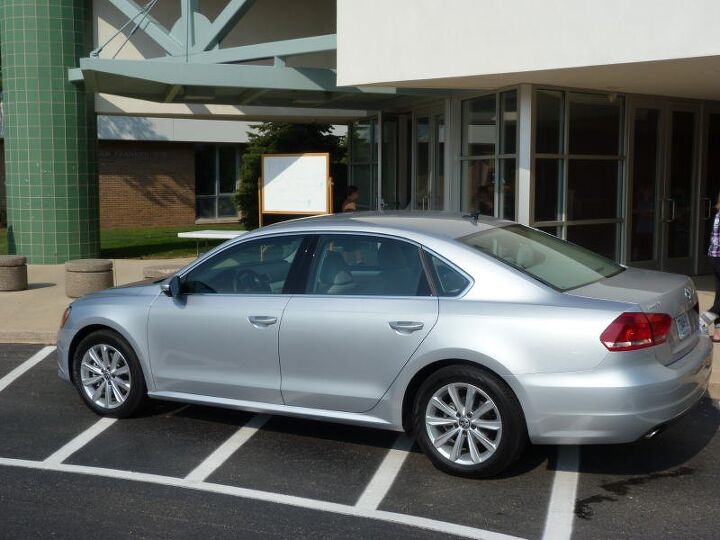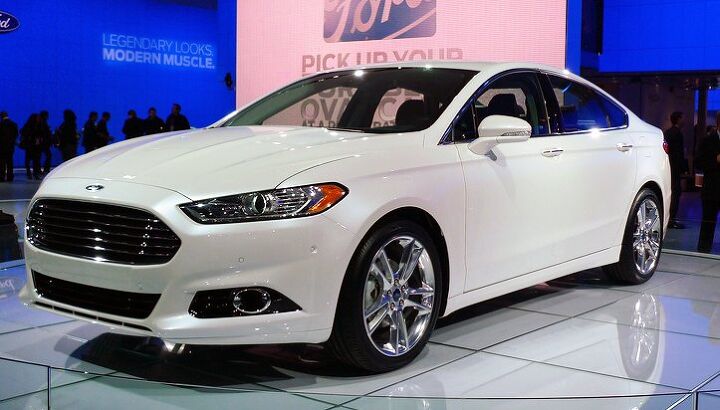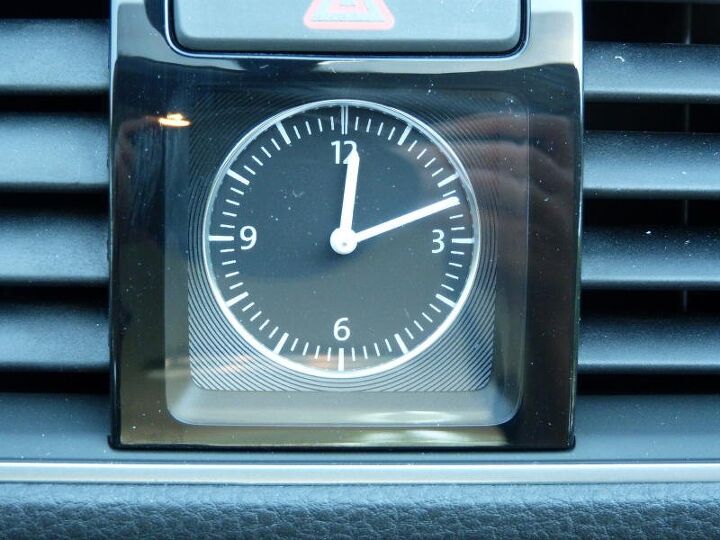#Quality
Question Of The Day: Which Car Companies Do You Not Like… But Respect?
The late Gore Vidal was fond of saying, “Gratitude can be a complicated thing.”
He was right. Whether you are a hater, or simply a chronic critic, the act of complimenting those who follow the beat of a different drummer is usually not within the tip of the human tongue.
We want things our way… and sometimes we’re just plain wrong.
Car Reliability Stats Updated, Passat Problems Pinpointed
Whenever we post about a Volkswagen, comments about reliability (or, more specifically, the lack of it) inevitably follow. So few will be surprised that, with the latest update to TrueDelta’s car reliability stats, the 2012 Passat again received subpar marks. Though the big sedan’s score is better than earlier, it remains considerably worse than most other 2012s. Digging through the repair reports, a common cause emerges. Ignition coils aren’t failing. Nor are window regulators. Instead, the most common problem for these cars happens to be rattles.
2013 Ford Mondeo Delayed
Senator Chuck Grassley Wants NHTSA To Re-Open Toyota Sudden Acceleration Case
TrueDelta and J.D. Power IQS Updates: How Bad Are the FIAT 500 and VW Passat?
Last March I shared some preliminary car reliability stats for the FIAT 500 and new Volkswagen Passat. The 500 looked very good at the time. The Passat was at the other extreme. Another three months have passed, and TrueDelta’s car reliability stats have been updated to include owner experiences through the end of March 2012. In these updated stats, the FIAT remains excellent while the Passat has improved. But in J.D. Power’s annual Initial Quality Survey (IQS), released yesterday, they’re both awful. What gives?
Another Plugin Problem: A123 Warns Of "Potential Safety Issue" With Fisker Karma Battery
In the ramp-up to the launch of the Chevy Volt and Nissan Leaf, a great debate seized the engineering community: was Nissan opening itself to problems by not including a active thermal management system for the Leaf’s battery pack, or was Chevrolet’s liquid-cooled approach simply adding unnecessary complexity? Well, thus far, the verdict seems to be in Nissan’s favor. Though Leaf has been troubled by some dissatisfaction with its real-world range, the Volt has endurd the first technical semi-scandal of the plug-in era, when federal regulators found that ruptured coolant lines could cause fires. Now the liquid-cooled approach is hitting its second challenge, as Fisker’s battery supplier A123 Systems is warning in a letter [ PDF] that
some of the battery packs we produce for Fisker Automotive could have a potential safety issue relating to the battery cooling system.
Ruh-roh!
GM Considers Volt Battery Redesign, Halts European Deliveries, Will Miss US Sales Goal, Recall Or Buyback Possible
In the comments section of yesterday’s post on the ongoing Chevy Volt fire investigation, I noted that GM might
retrofit Volts with crash protection that can maintain battery integrity in all crash conditions… Mary Barra has said that GM is
“continuing to work with NHTSA to investigate additional actions to reduce or eliminate the potential of a post-crash electrical fire.”
I think some kind of update on the battery integrity front is inevitable, but we shall see…
Sure enough, today Reuters is running an interview with GM CEO Dan Akerson, who says that European deliveries of Opel-branded Volts (called Ampera) would be delayed pending NHTSA’s investigation, and that maybe, just possibly, the Volt’s battery might have to be redesigned. Says Akerson:
We want to assure the safety of our customers, of our buyers, and so we’re just going to take a time out, if you will, in terms of redesigning the battery possibly
Unfortunately, Akerson’s mangled syntax makes it tough to know if GM is really going to redesign the Volt’s battery, or what the “time out” in question means. He does tell the AP [via The WSJ [sub]] that a recall or buyback are options as well. Though redesigning the Volt’s battery could be expensive and devastating for sales, GM’s current post-crash safety protocol is incredibly human resources-intensive, and likely very costly as well. And the fact that GM is even considering redesigning the Volt for safety a year after its release is going to create a huge sales and marketing challenge anyway. Volt production edged down by 199 units in November, and now GM’s sales boss Don Johnson tells the Detroit News that the Volt will miss its 10,000 unit 2011 sales goal. At this point, GM may just want to take a mulligan on the Volt’s first year, redesign the battery, and relaunch the thing.
TrueDelta Updates Reliability Data
We’re all aware that buying a first-year car can be risky, especially early in its production run. But how soon does the risk go away? Conversely, a new car model can initially seem problem free, only to have a common problem pop up once the cars have a few thousand miles on them. To cover both scenarios, TrueDelta promptly updates its car reliability stats four times a year, not just once a year after a half-year delay. Our recently updated reliability stats over owner experiences through the end of September 2011.
Put another way, the stats you’ll find elsewhere cover the same time period TrueDelta’s did two updates ago, back in May. How much difference can half a year make? In the case of some new Fords, quite a bit. A year ago the Fiesta had a reported repair frequency of 130 repair trips per 100 cars per year, about three times the average. Six months ago this had improved to 102, still much worse than average but heading in the right direction. With the latest update it’s 66 and within the range we consider “about average,” if still a little on the high side. Our earliest data for the 2012 Ford Focus suggested that it might similarly have a buggy launch, but after including more recent months its stat is 42 repair trips per 100 cars per year, very close to the average. Ford appears to have fixed the early bugs very quickly. But not quickly enough: other sources, using survey data from last spring, will report “worse than average” for at least the next year.
This Is The Chevy Volt's Post-Crash Safety Protocol
TTAC has received the following protocol, developed by GM in the wake of the June Volt fire at a NHTSA facility in Wisconsin, from a GM source and has confirmed its legitimacy with a second GM source. Though the procedure may be refined based on the findings of NHTSA’s latest round of tests, it gives a good picture of what GM currently does to ensure the safety of Volt driver and passengers as well as rescue workers, towing company workers and salvage yards. And, I have to say, it puts some of my fears about this safety scare to rest. It hadn’t occurred to me that GM’s Onstar system could provide opportunities to respond to crashes in real-time, and apparently the system provides a wide variety of data with which GM’s “corporate SWAT team” can tailor its response to any Volt crash event. Hit the jump for the full procedure.
Volt And Consequences: GM Responds To NHTSA Volt Investigation
With NHTSA opening a formal defect investigation into the Chevy Volt, GM is moving to defend its rolling lightning rod (no pun intended) and allay consumer fears about its safety. Yesterday I briefly appeared on Fox Business’s Your World With Neil Cavuto show to talk about what the intro to my segment referred to as “the hybrid from hell” and the “killer in your garage.” I tried to explain that the danger to consumers was basically nil, and that the real concern is for rescue, towing and salvage workers. And I would have explained why NHTSA’s tests still leave some serious questions open, but my “fair and balanced” approach meant that my segment ended up being extremely short. So let’s take the opportunity now to look past the hysteria and pinpoint the real issues with NHTSA’s investigation into the Volt.
NHTSA Triggers "Thermal Events" In Volt Batteries, Opens Formal Investigation
NHTSA has has opened a formal defect investigation into the Chevrolet Volt, on the grounds that
Intrusion in a crash may damage the battery, which may result in a substantial thermal reaction and fire
We knew that NHTSA was already looking in to this type of defect after an earlier test incident, but the official investigation resume [ PDF] lists three separate thermal events that have occurred as a result of NHTSA tests. Hit the jump for the official explanation of this sequence of events.
CR: VW Press Cars Don't Match What's On The Dealership Floor
TTAC has long held that reviews of press cars made available by manufacturers at launches and press fleets must be complemented by reviews of vehicles acquired from dealer lots. It’s been a controversial position at times, and I’ve had to do battle with OEMs as recently as a few months ago to explain why dealer car impressions matter. Today, Consumer Reports is proving the point by revealing
When VW dropped off an early media car this summer, I remember looking at the trunk and saying to myself “well, at least both of the cheap hinges are dressed up with plastic covers, unlike the Jetta, which just has plastic on the side with the wiring.” As you can see in these two photos from Car & Driver and Edmunds it appears that the Passats in VW’s press fleet have covers on the hinges.
But not that Passat you just bought. No, your new Passat isn’t as nicely finished as the press version.
Like all the vehicles we put through testing, Consumer Reports buys retail samples at a car dealership. I personally purchased the Passat TDI we’re testing. (We also bought a 2.5 SE and a 3.6 SEL Premium.) As you can see in our images, none of the Passats have the two plastic covers found on the press cars. Consumers apparently only get a cover for the wiring loom hinge; the other one goes bare.
Interestingly, we had a somewhat similar issue with VW when a Passat press car proved to be equipped in a spec that is not actually available at dealerships (V6 with 17-inch wheels). When we noticed the discrepancy (and by we, I mean Michael Karesh, of course), we asked VW how we had received a non-representative model, to which they replied that press fleet vehicles were “early builds” from the new Nashville plant, and therefore not necessarily in market-ready spec. Which is a reason, but not an excuse: the media can only serve consumers well if we’re given representative cars to review. So, while these discrepancies are all relatively minor, details matter when you’re spending upwards of $20k on something. Hopefully VW and the rest of the industry will learn from this experience and make greater efforts to equip their media cars exactly to dealer spec. One also hopes that Motor Trend has driven at least one Passat that’s not from a press fleet…
Customer Care: Whose Problem Is It Anyway?
Three years ago I suggested that Detroit win back car buyers by doing something no one seemed to be doing: provide customer care deserving of the name. In a similar vein, Steve Lang recently asked readers whether manufacturers or the government should do more when a model commonly suffers from an expensive problem. Well, according to an article in Automotive News this week GM has strongly encouraged its dealers to pick up the tab on more out-of-warranty repairs to reward and create loyalty.
According to the article, the bottleneck hasn’t been GM—the customer care money has been there, but dealers have been too tight with it because of fears that GM would punish them if they spent it. Why did dealers have these fears in the first place? The article doesn’t say. The important thing isn’t how these fears came to exist, but that they’re currently unwarranted. One dealer calls the new “open pocketbook” approach to keeping customers happy a “seismic shift.” Problem solved?
Martin Winterkorn Less Impressed By New (European) Honda Civic
Remember the video of Volkswagen CEO Martin Winterkorn testing the quality of the new Hyundai i30? Thanks to Autobild, we’ve found a companion video from the Frankfurt Show, in which Winterkorn, along with VW Chairman Ferdinand Piech, gives the once-over to the new European-market Honda Civic. According to Autobild, Piech kept his nickname “Fugen-Ferdi” (Gap-Ferdi) relevant by checking the new Civic’s panel gaps. And, in contrast to the Hyundai video, the intelligible portions of Winterkorn’s commentary were less than entirely complimentary. The German magazine reports
A member of the VW entourage says that “(Honda) has had good role models.” But the big boss played down the praise for VW with a smile, and responded generously “they were once a role model for us.”
Note the use of the past tense, then contrast with Winterkorn’s reaction to the Hyundai. In just two videos you can see the balance of automotive power shifting…
Ask The Best And Brightest: What's Your Favorite "Center Stack"?
According to Automotive News [sub], the automotive supplier industry is going coo-coo for center stacks. Calling it “the hottest chunk of vehicle real estate” for suppliers, AN reports that the center console has “become a California gold rush of opportunity.” Having glanced at the headline, I figured the topic would make for an interesting question: what’s your favorite center stack? If nothing else, I figured it would be an opportunity to sing the praises of my M Coupe’s stripped-down, old-school console (I realize there’s nothing more dull than a car writer praising his own vehicle, but bear with me… there’s a point coming).






















Recent Comments